
Discovering your menstruation as a spiritual practice
Yasmine understands her menstruation as a spiritual practice and shares in this interview how she is connecting more with her own body through cycle awareness.
Reconciling music and menstruation? Artist and feminist Alexandra Vildosola has successfully united that. A topic that is still taboo in today’s society is reinterpreted in “dialogue with a rose“. In this guest article, Alexandra takes you on a concert against the period taboo:
Now we have actually finished the project: a project where art and period merge. It was beautiful, a unique experience, and all those emotional terms we artists love to use. But for me, it was also insufficient. Not the performance, but the dialogue.
We won the award for re-performability at D-BÜ 2020 with great feedback on research, processing, costume, and the concept of uniting music and menstruation. But we just haven’t had a “dialogue with a rose” concert yet. Without an audience, a link is missing, and so it reminded me more of theater dialogue than conversation.
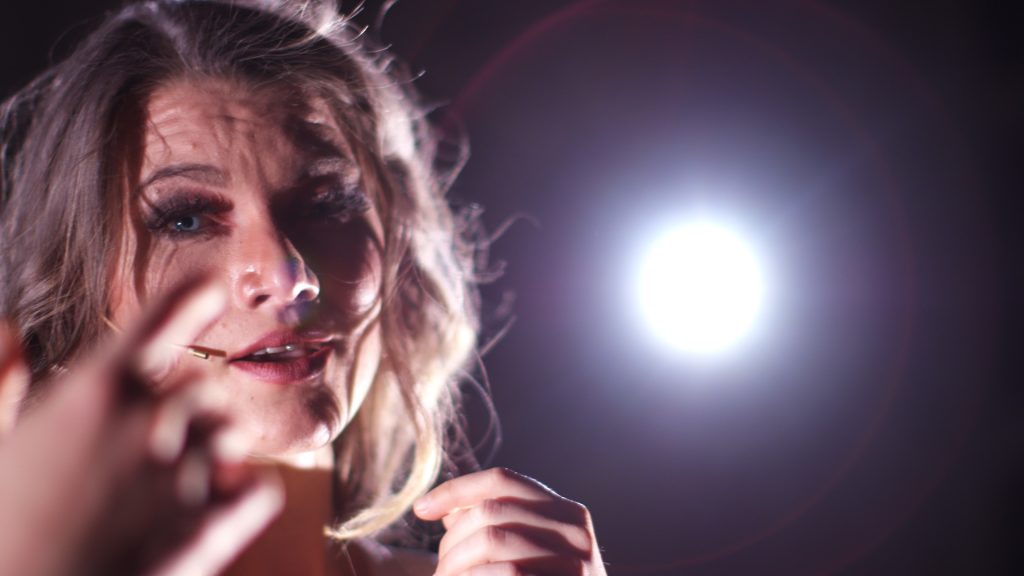
When I first started talking about menstruation, I considered myself open and enlightened: I no longer “dealt” with tampons. And if someone asked me about my bad mood, I was perfectly capable of saying that I was menstruating. Suddenly, I found out so much more. Accordingly, I then packed as much as I could into this concert to combine music and menstruation. And I can only recommend that every person embarks on this journey: to read for themselves, research, and seriously reconsider our communication on the subject of menstruation in everyday life.
On the one hand, there are the different experiences of the women with whom I was able to talk. On the other hand, there is also the medical aspect: background knowledge, which should actually be general education and – this is extremely shocking – is completely irrelevant in gynecology. Then there is also the political and economic aspect. Right now, the topic of “Period Poverty” is also very present in our country. I had finished writing the first version of the concept Music and Menstruation, but somehow I was still not happy. Especially the third part was bothering me. My grandma recommended a book from the eighties: “Das Schwarzmond Tabu.” This book moved me personally the most; it is a mystical journey to the menstruation of the matriarchy. The cultural importance of menstruation for any idea of the origin of the world is shown here. In addition, the resulting supremacy of the menstruators with different excavation findings and research. This got me involved in an ancient priestess cult, which we promptly brought to the stage.
After that, we went into the conversation. I suddenly had so much knowledge; between each leading question interview, I read new things, learned new things, and so the interviews got longer and longer. Some interviews even lasted 2 hours, which made the editing of the interviews much longer. I talked to friends and fellow students. Women also came forward that I didn’t know before, or at least not well.
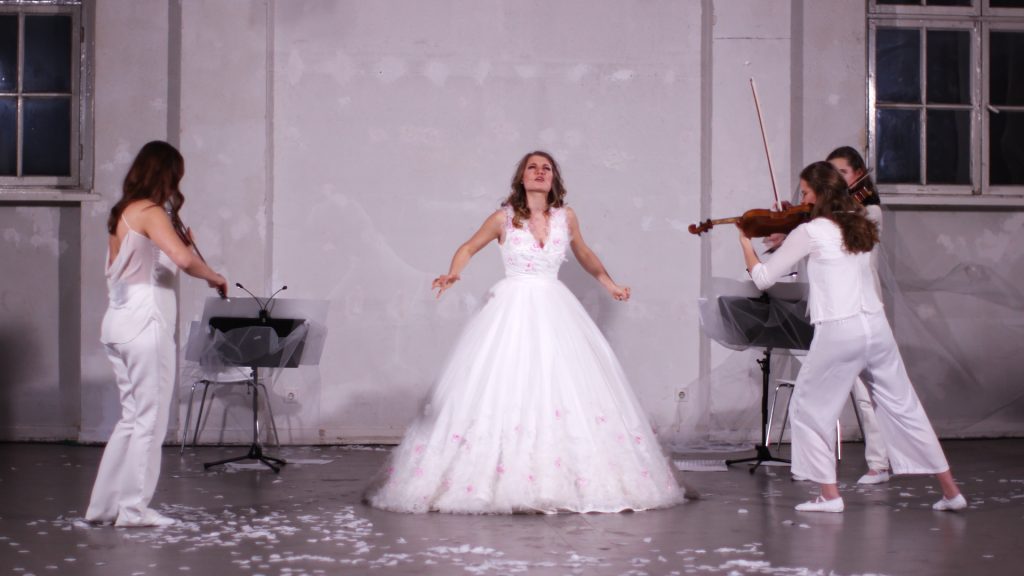
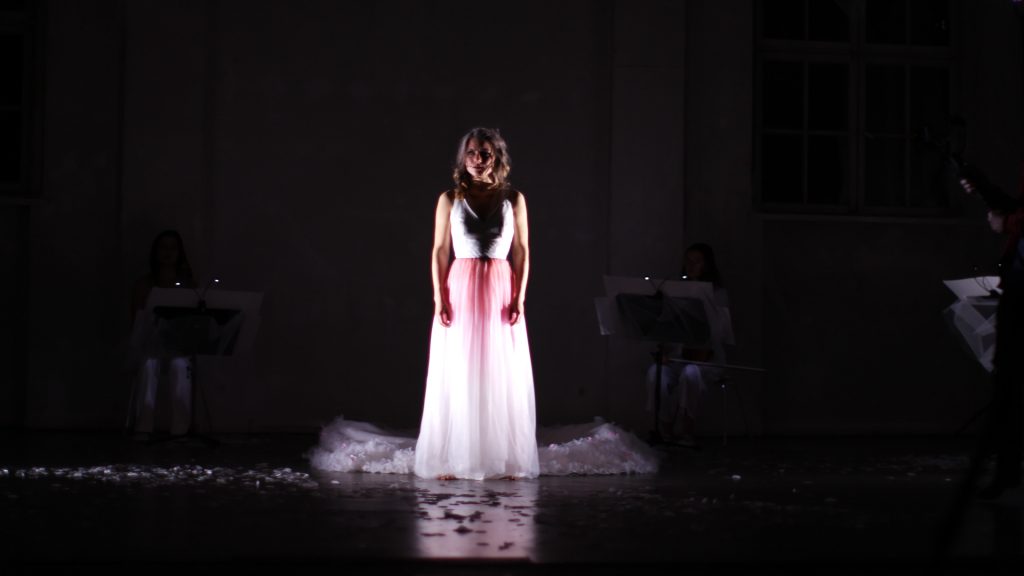
Photo Credits: Alexandra Vildosola
The interviews with my mom and grandmother were extraordinary for me. I understood many things in a completely different way, from my own childhood and the way I dealt with the subject in my parental home. At the end of the interview with my grandmother, I asked her what she would like to tell her mother about menstruation. Her response was, “That she should have just talked about it more.” So I also asked what she would like to tell her daughter. That’s when she smirked, “That I should have talked to her more about it.”
In retrospect, it’s a bit of a shame for me that no men responded to my call. I sincerely hope that moving forward, non-menstruators will be interested in this conversation. I would like to see more diversity for the resumption.
We had many conversations in the team. The Dialogue of the Rose meant to us that, in any case, ONE woman should be involved. But the people involved in the conversation are variable, after all. After all, we can’t exclude half of society when the claim is to sensitize society in a unified way. Menstruation is also a sensitive topic for trans people.
From all these interviews, we wanted to make a chorus of menstruation. That’s why the voices of non-menstruators are so important. Questions, worries, doubts that a father has, a loving person, a brother. Ignorance leads to helpless reactions.
There were different thoughts about this choir: On the one hand, from the beginning, it was the idea of the voice of society – consciously outside from our artist environment. A dialogue needs this counterpart, and we didn’t know how that could look with an audience in this performance.
The choir is often musically uniform, a loud voice, but with us, different voices became loud. It was essential to me not to choose only horror stories. The first scene focuses on a beautiful story: a young girl who experienced this day as an exceptional women’s day.
And then, as the third element of music and menstruation, our cellist Kiara Konstantinou joined us. She offered me right in the first conversation to compose electronic music for the soundscapes. First, there is the piece “Curse and Poison” about the history of menstruation. It is the lead-in to our priestess scene. Mystical, the women discover power in themselves and their menstruation.
The second piece is called “ProMens” and is an empowering summary of our research, dialogue, and concert. The women in the interviews gave us solid and formative sentences – a magical moment that moves us to tears every time.
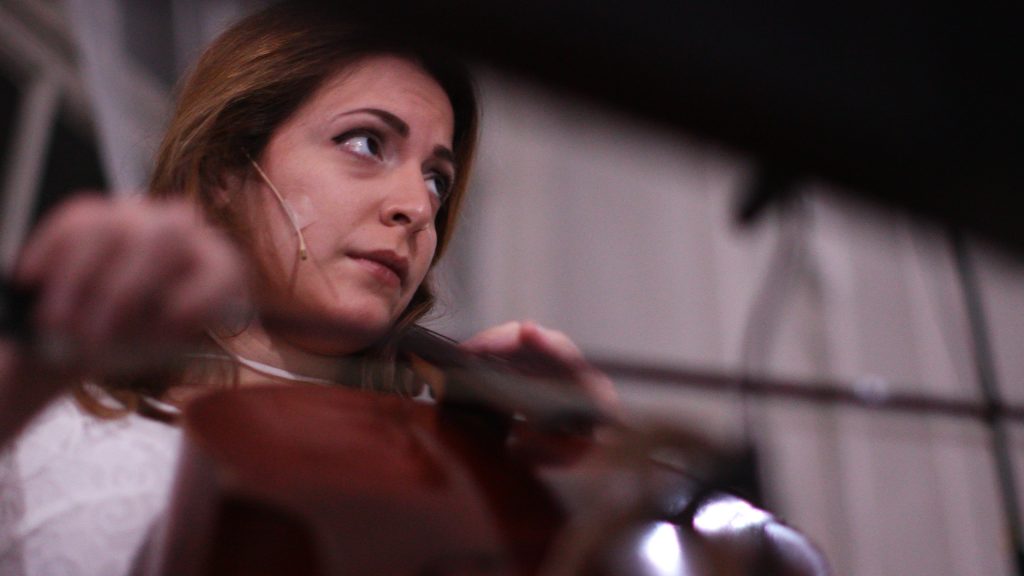
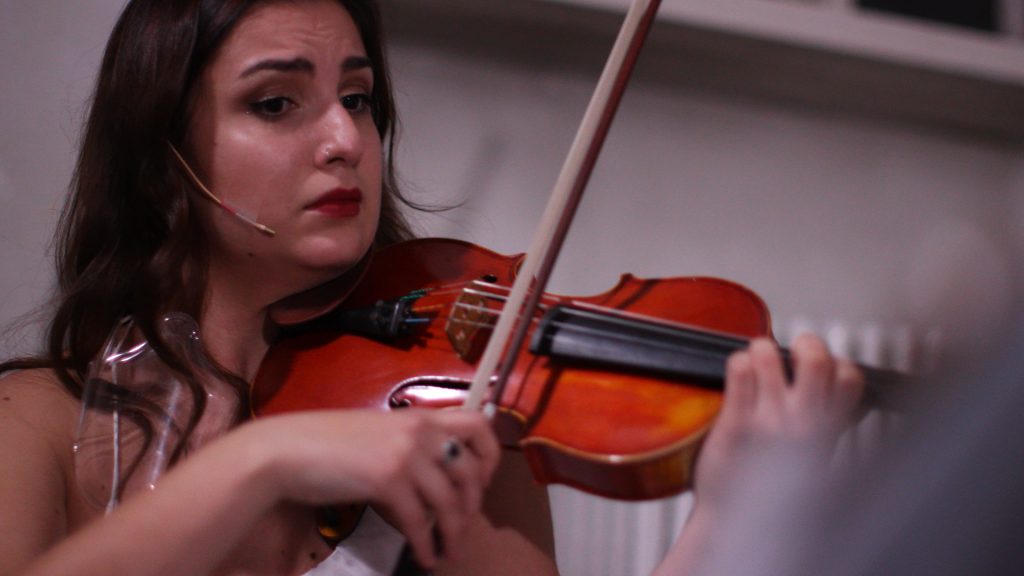
Photo Credits: Alexandra Vildosola
The genre of song is quite old, so are its lyrics. Magdiel Baptistin Vaillant arranged the classical pieces written for piano for the string quartet. We wanted to stay as close as possible to the original, yet the difference between a piano and a string quartet is gigantic. This meant a lot of work for the four musicians. So we searched and searched together for better and better variations. Here a voice was exchanged last minute, or there a tone was added.
Three own compositions for the string quartet also came from Magdiel. “Bleeding” starts immediately after the healing soundscape “Pro Mens”. Clearly more aggressive: the blood pulses through the veins, vital, we are not afraid of it. Yes, we bleed. Get used to it.
In the end, the biggest challenge was the complex room acoustics. The sound in the auditorium – breathtaking. On stage – a blurry wobble that made it virtually impossible to follow the singing of the quartet. Even more extreme for a piece where the musicians were supposed to make music together with the soundscape. So here I had to come up with an emergency solution: spontaneously, I took the soundscape from the interface with headphones and conducted it.
Of course, significant and minor accidents are not missing in such a production. There were two fixed cameras during the video shoot: one was directly in front of me, the other diagonally in the room. The cameraman was at the diagonal for the entire concert. Every now and then, he would look at the long shot to check the image and then go back.
So I stand to conduct: With headphones in my ears and sheet music in front of my nose, so I couldn’t move an inch to the side. Then I give the cue, and the cameraman moves right in front of me and stays there consistently for the whole piece. I worked up quite a sweat, trying to tiptoe my arms up high enough. After all, I have to be visible to my musician somehow. I don’t think any of us believed we were really together until we heard the recording.
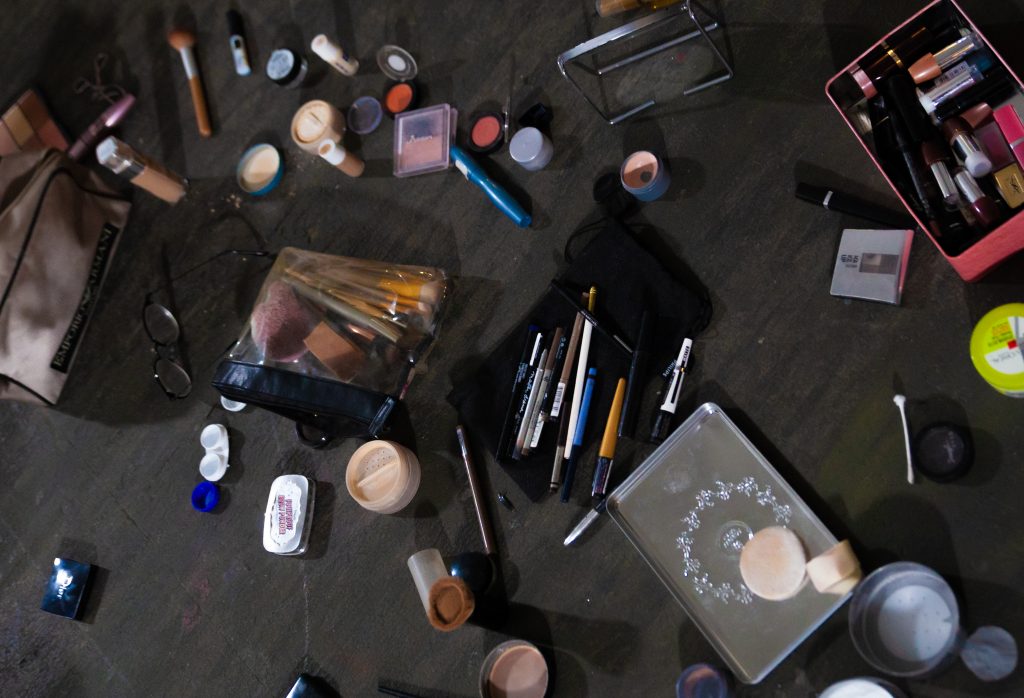
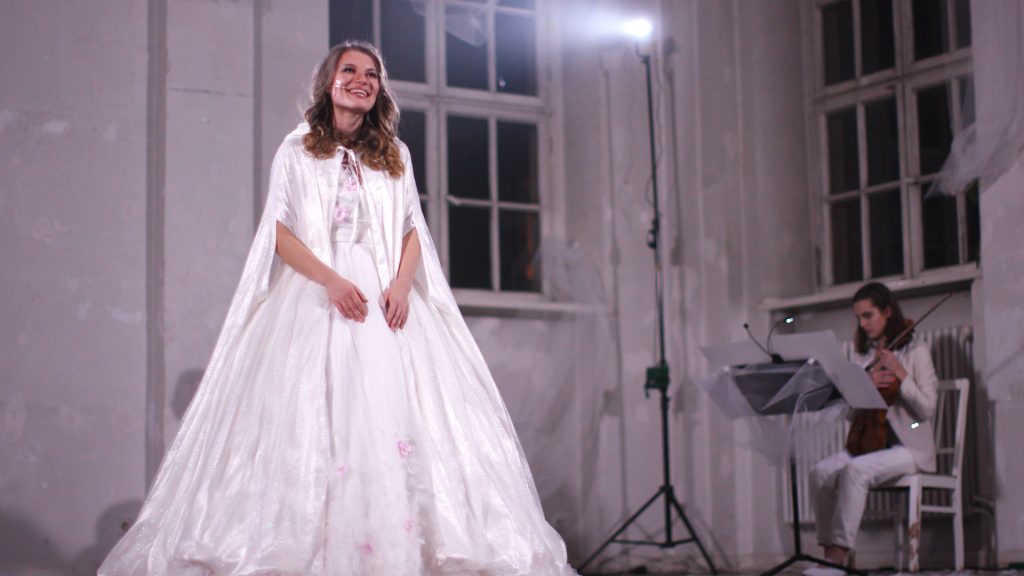
I can consider myself lucky that I got precisely the five members I wanted for the concept. Five very different characters, and it was my pleasure to use them a little bit as well: whether they were militant, innocent, or curious. We were even able to include a personal story, which I won’t reveal here. And there were also interesting discussions in rehearsals. One scene in which Mara is assaulted by the other musicians to take away the joy of her first menstruation and impose shame on her. Mara’s reaction to this was, “Well, I’m getting angry right now. I don’t want to feel ashamed”. We had a conversation about how it was 10 years ago, we want to show this development at the concert. For me, this is an elementary part of the work as a team, which we will undoubtedly continue to cultivate. We are also in dialogue with each other and with ourselves.
It was only a few months before we received the confirmation for the competition finals. And with it the support of the university to produce the concert. So we made a precise schedule, which was very tight. Then two of our musicians fell ill with Corona, and three rehearsals were canceled without replacement. Suddenly we were under tremendous time pressure. It was just a matter of getting a full concert on stage; development would have to wait. That’s the bitter truth of the music business in the corona pandemic. The real work happens in togetherness, which was and is so difficult these days.
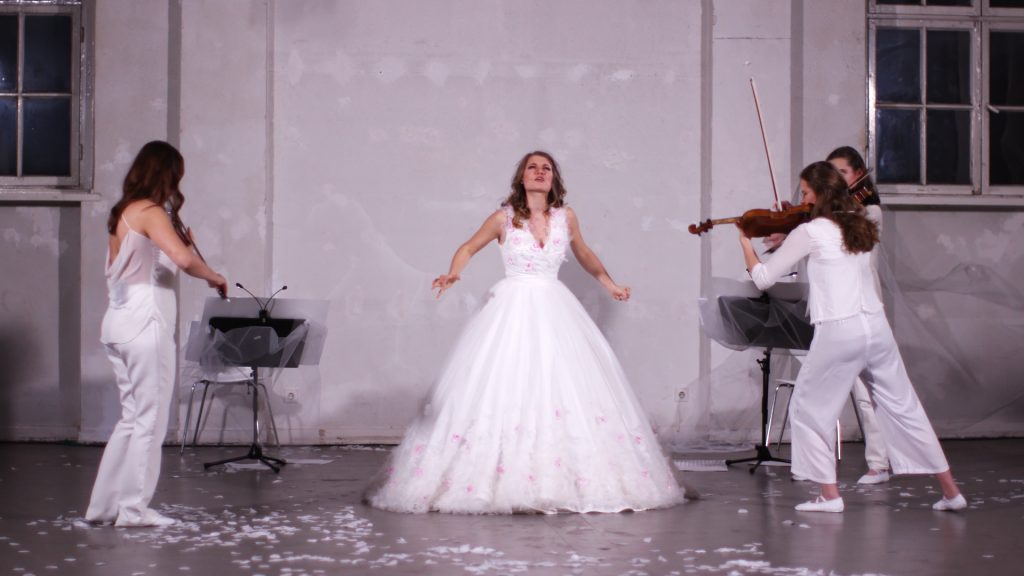
Working on the project has moved and perhaps changed all of us as an ensemble. I now keep a cycle diary, which is good for myself and my relationship. I have expanded and changed my communication. Especially exciting for me are the conversations with my brothers.
I am happy about situations where menstruating and non-menstruating people have told me that it now makes them think. How they want to talk to their daughters about menstruation, make themselves understood to their partner, and catch up on a conversation with their parents. But actually, I would like to see more of a platform for this dialogue, and I would like to get more people on board. We are now talking about an expanding dialogue. We had this one with ourselves, and this is a start. It’s like exploring, feeling, and smelling your own blood.
We had the dialogue with each other as an ensemble, and I had it in the interviews with individual women. There is a lack of extension. It was an extraordinary experience to see a created concept for a live dialogue converted into a video. But I’m not sure if it satisfies me.
Where do we go from here? We decided as a team to make “dialogue with a rose” our concert series. At the moment, we are all stuck in the organization, but the concept of music and menstruation is alive and developing. Because the development in classical music is essential to me. If we claim that it is not dead, we must also treat it as something living, breathing, changing. Loosely based on Heraclitus, “You can’t play the same concerto twice.”
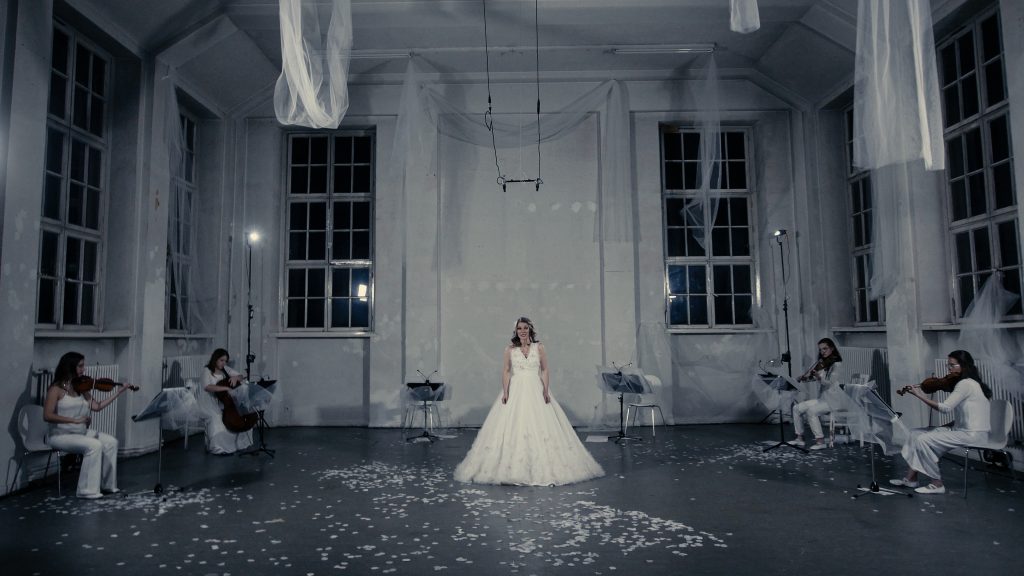
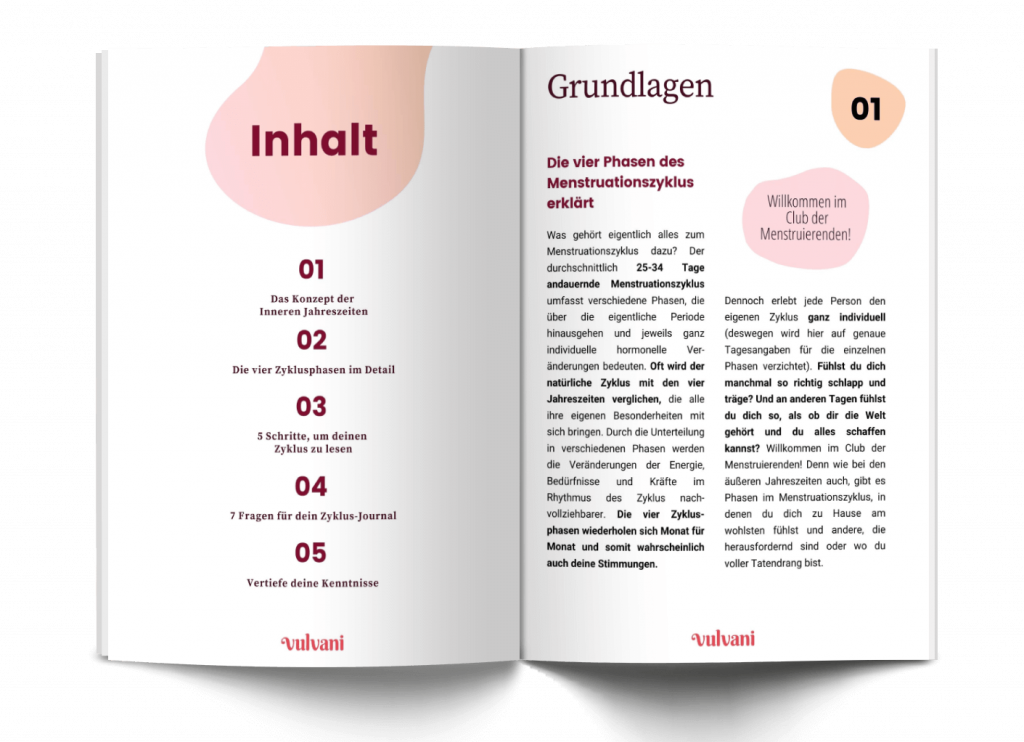


Yasmine understands her menstruation as a spiritual practice and shares in this interview how she is connecting more with her own body through cycle awareness.

What options are there for male birth control? Ailsa delivers an overview of what is available now, and what may come in the future.

Sustainable underwear? The founders of TUKEA talk about fair labour conditions, body diversity and body literacy.
…and empower countless women to make empowered choices about their bodies!

